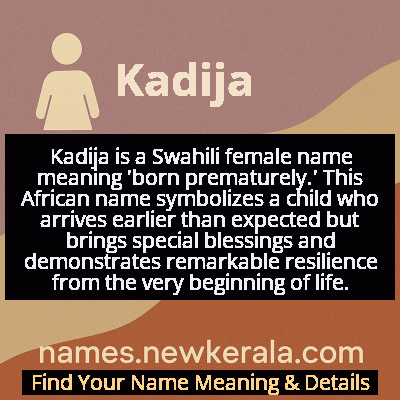Kadija Name Meaning & Details
Origin, Popularity, Numerology Analysis & Name Meaning of Kadija
Discover the origin, meaning, and cultural significance of the name KADIJA. Delve into its historical roots and explore the lasting impact it has had on communities and traditions.
Name
Kadija
Gender
Female
Origin
African
Lucky Number
9
Meaning of the Name - Kadija
Kadija is a Swahili female name meaning 'born prematurely.' This African name symbolizes a child who arrives earlier than expected but brings special blessings and demonstrates remarkable resilience from the very beginning of life.
Kadija - Complete Numerology Analysis
Your Numerology Number
Based on Pythagorean Numerology System
Ruling Planet
Mars
Positive Nature
Generous, passionate, energetic, and humanitarian.
Negative Traits
Impulsive, impatient, moody, and can be overly emotional.
Lucky Colours
Red, maroon, scarlet.
Lucky Days
Tuesday.
Lucky Stones
Red coral, garnet.
Harmony Numbers
1, 2, 3, 6.
Best Suited Professions
Military, sports, philanthropy, leadership roles.
What People Like About You
Courage, energy, leadership, generosity.
Famous People Named Kadija
Khadija bint Khuwaylid
Businesswoman and First Muslim
First wife of Prophet Muhammad and first convert to Islam
Khadija al-Salami
Film Director
First Yemeni female film director addressing women's issues
Khadija Shaw
Professional Footballer
Jamaican international striker for Manchester City
Khadija Ismayilova
Investigative Journalist
Azerbaijani journalist exposing government corruption
Name Variations & International Equivalents
Click on blue names to explore their detailed meanings. Gray names with will be available soon.
Cultural & Historical Significance
In Swahili-speaking regions of East Africa, the name carries additional layers of meaning related to its literal translation 'born prematurely,' often symbolizing a child who arrives unexpectedly but brings special blessings. The name represents resilience, as premature births in traditional societies required both the child and mother to demonstrate extraordinary strength to survive. This dual heritage—Islamic reverence and African cultural symbolism—makes Kadija a name that bridges spiritual devotion with practical resilience.
The name also reflects the historical trade connections between Arab and African cultures along the Swahili Coast, where Islamic traditions blended with local Bantu customs. This cultural fusion created unique naming practices where Arabic names acquired additional meanings in Swahili contexts, enriching the symbolic weight carried by names like Kadija across generations.
Extended Personality Analysis
Women named Kadija are often perceived as possessing remarkable inner strength and resilience, reflecting the name's meaning of surviving premature birth. They tend to be determined individuals who overcome challenges with grace and perseverance. Many Kadijas exhibit natural leadership qualities, combined with deep compassion and nurturing instincts toward others. Their personality often blends traditional values with modern independence, making them adaptable yet grounded individuals.
Kadijas typically demonstrate strong intuition and emotional intelligence, allowing them to navigate complex social situations with wisdom. They are known for their loyalty in relationships and their ability to provide steadfast support to family and friends during difficult times. The combination of spiritual depth and practical problem-solving skills makes them respected figures in their communities.
These personality traits often manifest as a quiet confidence rather than overt assertiveness. Kadijas tend to lead by example rather than command, earning respect through their consistent reliability and ethical conduct. Their life journey often reflects the name's symbolism—starting with challenges that ultimately strengthen their character and prepare them for leadership roles. This creates individuals who are both spiritually centered and effectively engaged with the practical demands of daily life.
Modern Usage & Popularity
In contemporary times, Kadija remains a popular name across Muslim communities in Africa, particularly in East African countries like Tanzania, Kenya, and Uganda where Swahili is spoken. The name has maintained consistent usage while adapting to modern naming trends, often appearing alongside more contemporary middle names. While not among the most common names in Western countries, it has gained some visibility through immigration and cultural exchange. The name continues to be chosen by parents who value both its Islamic heritage and its specifically African cultural resonance. Recent years have seen the name used by public figures in sports, arts, and activism, helping to maintain its relevance across generations. Digital globalization has also contributed to the name's spread, with social media allowing cultural names to transcend geographical boundaries while maintaining their traditional significance.
Symbolic & Spiritual Meanings
Symbolically, Kadija represents the triumph of life over adversity, embodying the concept that something precious can emerge from challenging beginnings. The premature birth meaning transforms into a metaphor for unexpected blessings and the idea that great potential can come in small packages. The name symbolizes resilience, as it suggests someone who defied odds from their very entry into the world. In a broader sense, Kadija represents the fusion of spiritual devotion and worldly capability—the balance between faith and action. The name carries connotations of protection and nurturing, as premature infants require extra care, extending symbolically to the bearer's role as a protector and caregiver in their community. It also symbolizes authenticity and staying true to one's roots while navigating modern complexities, serving as a reminder that our beginnings, however challenging, shape but do not limit our potential.

